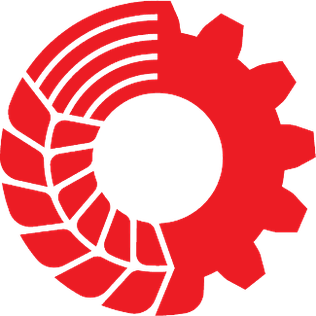Communist Party of Canada Parti communiste du Canada | |
|---|---|
 | |
| Abbreviation | CPC (English) PCC (French) |
| Leader | Liz Rowley[1] |
| Founded | 28 May 1921 |
| Newspaper | People's Voice |
| Youth wing | Young Communist League of Canada |
| Political orientation | Marxism-Leninism |
| International affiliation | International Meeting of Communist and Workers' Parties |
| Colours | Red |
| Website | |
| https://communist-party.ca/ | |
| Part of a series on |
| Communist parties |
|---|
The Communist Party of Canada (CPC) is a Marxist–Leninist party in Canada.
History
Foundation
The Communist Party of Canada was founded in May 1921 near Guelph, Ontario. Its first congress was held illegally in a barn.[2]
Great Depression
During the Great Depression, the CPC founded the Trade Union Education League. Because the right-wing unions refused to strike, 90% of strikes in the 1930s were led by communists. In 1931, General Secretary Tim Buck was arrested. 1,200 Canadians fought in the Spanish Civil War as part of the Mackenzie–Papineau Battalion.[2]
Second World War
The CPC initially opposed Canadian involvement in the Second World War but changed its position in 1941 after the invasion of the Soviet Union. In 1940, Dorise Nielsen from Saskatchewan became the first communist in the Canadian parliament.[2]
1990s
After the fall of socialism in Eastern Europe and the overthrow of the Soviet Union, the CPC took a revisionist line under General Secretary George Hewison. The party briefly abandoned revolutionary socialism for social democracy but reaffirmed Marxism–Leninism at the 30th party congress in 1992.[2]
In 1993, Brian Mulroney's Conservative government passed amendments to the Elections Act which stripped parties of their registered status if they failed to field 50 or more candidates in the 1993 election, raised the required deposit to nominate a candidate from $200 to $1000, forcing parties to have at least $50 000 in order to avoid being deregistered, and if a party was not able to field 50 candidates, either due to a lack of candidates or funds, they would be deregistered and forced to liquidate all their assets and pay off all outstanding bills. This practically amounted to shutting down the party. As the CPC was not able to meet these insane requirements, they were basically forced to shut down, though did not formally disband and would spend the next 13 years fighting these unconstitutional amendments in court, eventually getting the sections of the law struck down in 2001 and a $65 000 settlement for damages caused, though the Federal government did not admit any wrongdoing and the CPC said this figure was very modest.[3]
Membership
Any resident of Canada who is at least 16 years old may join the party. Party members pay an initiation fee of $1 as well as monthly dues, which range from $1 to $45 depending on income of the member.[4]
Structure
National level
Party conventions are held at least once every three years. The convention elects the Central Committee and can amend the party program and constitution. Party members who have been in good standing for at least a year may be delegates to the convention. The convention also elects an Audit Committee and Appeals Committee of three members each, who are on the Central Committee but cannot vote.[4]
Provincial level
Provinces with multiple clubs hold a Provincial Convention at least once every three years. The Provincial Convention elects a Provincial Committee, which meets at least twice a year. Party members must have been in good standing for at least two years to be eligible for the Provincial Committee.[4]
Local level
The lowest level of party organization is the club, which consists of at least three members. Areas or cities with multiple clubs hold a Regional Convention once every two years, which elect a Regional Committee. Regional committee members must have been party members in good standing for at least a year.[4]
Political positions
The CPC stands for Canada's withdrawal from NATO and NORAD. It also supports self-determination for Quebec and the Indigenous Peoples in Canada.[2][5]
Controversies
References
- ↑ "Communist Party elects first woman leader" (2016-02-16). Communist Party of Canada. Archived from the original on 2016-03-04. Retrieved 2023-06-14.
- ↑ 2.0 2.1 2.2 2.3 2.4 "A short history of the Communist Party of Canada" (1996). Communist Party of Canada. Archived from the original on 2021-11-12. Retrieved 2022-06-19.
- ↑ "The Figueroa v. A-G of Canada case: The Communist Party’s legal Challenge to Anti-Democratic Aspects of the Canada Elections Act". Communist Party of Canada. Retrieved 2023-06-02.
- ↑ 4.0 4.1 4.2 4.3 39th Convention (2019). Party Constitution. Communist Party of Canada.
- ↑ "Program of the Communist Party of Canada Chapter 4: The Canadian State, the Nations and Peoples of Canada, and the Crisis of Democracy" (2023-05). Communist Party of Canada. Retrieved 2023-06-14.